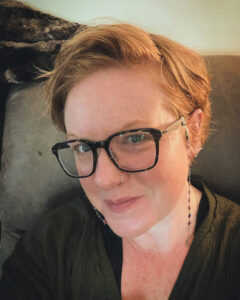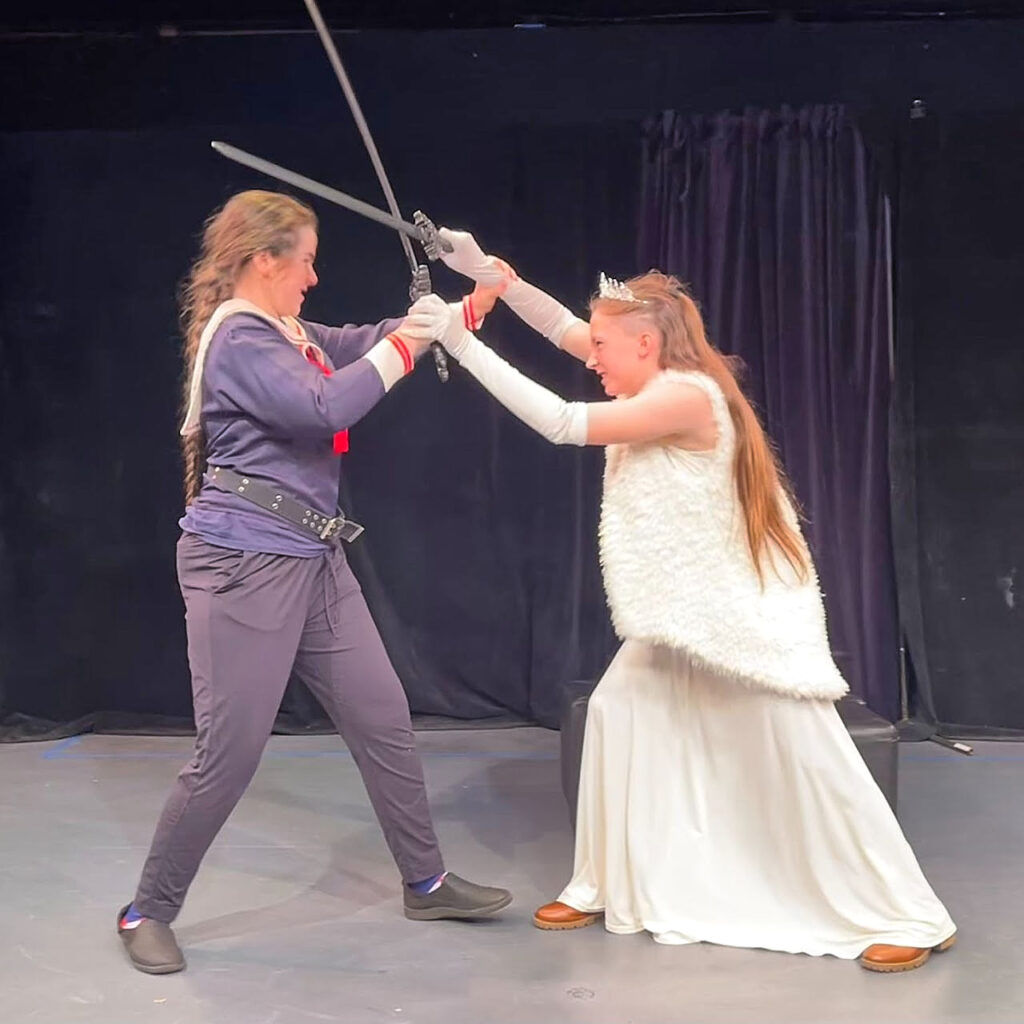There is a pineapple pinned to theater director and teacher Kate Magill Robinson’s bag. In fact, there are pineapples all over her house, like a race of enzyme-rich aliens slowly engulfing the property. They’re gifts, the product of a running joke from years ago, when the teens of Greenbelt Recreation’s Camp Encore couldn’t find a flower bouquet at the Co-op. They decided that a pineapple was close enough.
“I thought you might be interested in those,” Kate says, watching me explore a deck of colorful playing cards on the coffee table. The front of the pack reads, Zounds! A Shakespearean Card Game – and, yes, I started playing with it as soon as I sat down. On the living room wall hangs a photograph of Kate and her husband, Mark, at their wedding. The young-and-in-love couple stands on a lawn in a pale gazebo painted blue and white. “Mark built that,” she tells me, as part of the set of their company’s production of Much Ado About Nothing. Mark proposed to Kate onstage one night after a 60s-themed Hansel and Gretel. She holds the photo out to me, in which Mark is on one knee in front of a thoroughly shocked Kate in a big 1960s skirt.
Kate has been acting and directing Shakespeare for decades now, but “hated it growing up” – because the Bard was taught in English classes, framed as literature instead of as theater. But putting on Merry Wives of Windsor the summer after her first year of college gave her a new perspective and she continued acting in summer Shakespeare shows until she graduated. Her interest in Shakespeare developed further while she wrote study guides and researched the plays’ history for her classes. “I just like learning things,” she says simply.
For her teen homeschool class, held in the Greenbelt Arts Center (GAC), Kate adopts a fairly hands-off approach to directing. She stays seated, her eyes following the high schoolers’ progress behind her glasses. She notices my confusion upon seeing the set laid out for one of the short plays, about two would-be lovers in a café. The set is composed of two tables and four chairs despite the fact that, in the original show, there are only two characters. Kate tilts her head backward over her chair to look at me and explains, “I Kate-d it,” meaning that she divided the lines between two sets of actors. This kills two birds with one stone by making memorization easier and allowing room for multiple actors to share the spotlight. At one point, Kate’s daughter, Aria, joins her onstage to ask for help finding something.
“Hey, peach fuzz,” Kate murmurs, kissing the top of the little blond head.
Kate has always liked working with children. As a college student she pursued a degree in education, but the inflexible process grated on her. “My professor was explaining that ‘this is how you deal with the autistic kids’… I knew damn well that what works for this autistic kid isn’t going to work for this one.” She describes her frustration arguing with the professor during class, unable to alter his insistence on a uniform approach to handling students’ differences. Fed up, she dropped her education major and graduated from Shippensburg with a bachelor’s degree in interdisciplinary arts, which she readily declares is “a made-up degree.”
It may be just as well that Kate didn’t bother with the inflexible classes required for an education major; experience has instructed her far better than any teacher. She hasn’t yet grown too serious to engage with her kids as kids, indulging in such antics as standing behind one of the GAC poles and waving her arms in an imitation of an alien (so they have something to invoke for the alien-summoning warm-up, you understand). She is evidently long past alarm about more harmless shenanigans, and she stays remarkably composed throughout the work day; she leans over to make a note while three of the older actors wrestle for a script, and doesn’t even flinch when a pen is accidentally flung at her.
Ultimately, what brought Kate back to education after college was children. “I realized I could effect change,” she tells me. This, she explains, is her contribution to her students’ lives and futures, even though “I know I’m not saving the world.”
Maybe not, but word about Kate has spread among parents of homeschooled children, as well as among local youth. It’s gotten out that, if you need somewhere to go – if home’s not safe, perhaps, or you need a way to spend your summer vacation – you can find it with Kate and her actors. When it’s mentioned that neurodivergent kids and teens simply flock to her, as if by some shared instinct, she beams.
“I know!” she exclaims. “And I love it!”
Kate has been working to make the GAC more accessible, equipping the space with ramps and the like to improve mobility for actors and patrons. Her next big projects come this summer, when she will be directing Camp Encore through the Community Center and the Teen Summer Shakespeare Intensive production of Romeo and Juliet. She insists that it is not a love story, but “a cautionary tale about what happens when you let hate rule everything.” The cast and crew have been counting down the days until rehearsals begin.
There’s no one, it seems, in whom she doesn’t see potential. “You can always see in a kid that there’s more there,” she asserts.
But first, those kids need to be able to strip off their defenses. Kate is aware that some students join her classes primarily for a safe place, somewhere they feel they can be authentic — and that’s okay too, she promises. “We’ll find a place for you.”





